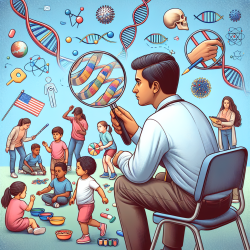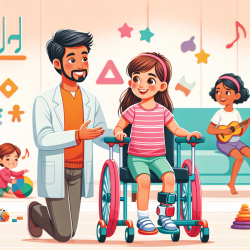The field of child psychiatry is rapidly evolving with advancements in genetic research, particularly through genome-wide association studies (GWAS). A recent study titled A genome-wide association study of total child psychiatric problems scores sheds light on the genetic underpinnings of psychiatric symptoms in children. This research offers valuable insights that practitioners can utilize to enhance their understanding and treatment of child psychiatric disorders.
Understanding the Genetic Landscape
The study analyzed over 6.8 million single nucleotide polymorphisms (SNPs) in 38,418 children across various cohorts. It revealed that common genetic variants significantly contribute to childhood psychiatric symptoms, with a SNP heritability of 5.4%. Notably, two loci reached genome-wide significance, indicating their potential role in influencing general psychopathology.
Key Findings and Implications
- SNP Heritability: The study found a moderate SNP heritability for total psychiatric problems, suggesting that common genetic variants play a crucial role in childhood psychopathology.
- Significant Loci: Two loci on chromosome 11 were identified as significant. These findings open new avenues for exploring how these genetic variations influence psychiatric symptoms.
- SBF2 Gene Association: The SBF2 gene, previously linked to neuroticism, was also associated with total psychiatric problems. This highlights the gene's potential pleiotropic effects on various psychological traits.
Practical Applications for Practitioners
The insights from this GWAS can be instrumental for practitioners in several ways:
- Tailored Interventions: Understanding the genetic basis of psychiatric symptoms can help tailor interventions more effectively to individual needs.
- Early Identification: Genetic markers can aid in the early identification of children at risk for developing psychiatric disorders, allowing for timely interventions.
- Holistic Approach: Recognizing the shared genetic factors across different psychiatric disorders encourages a holistic approach to treatment that addresses comorbid conditions.
The Need for Further Research
This study underscores the complexity of genetic influences on child psychiatry and highlights the need for continued research. Future studies should aim to replicate these findings and explore the causal pathways linking genetic variants to psychiatric symptoms. Additionally, expanding research to include diverse populations will enhance the generalizability of these findings.
The integration of GWAS insights into clinical practice holds great promise for advancing child psychiatry. By leveraging genetic information, practitioners can improve diagnostic accuracy and treatment outcomes for children with psychiatric disorders.
This blog post is based on findings from the research article titled "A genome-wide association study of total child psychiatric problems scores." To read the original research paper, please follow this link: A genome-wide association study of total child psychiatric problems scores.










